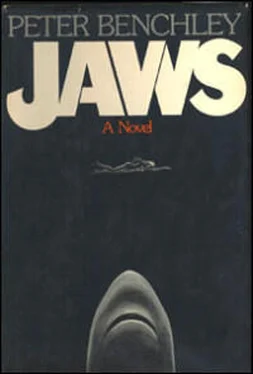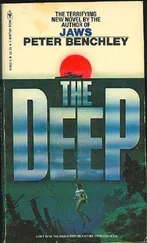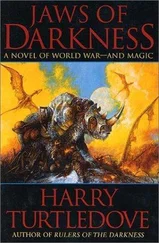Peter Benchley - Jaws
Здесь есть возможность читать онлайн «Peter Benchley - Jaws» весь текст электронной книги совершенно бесплатно (целиком полную версию без сокращений). В некоторых случаях можно слушать аудио, скачать через торрент в формате fb2 и присутствует краткое содержание. Город: New York, Год выпуска: 1973, Издательство: Doubleday, Жанр: Триллер, на английском языке. Описание произведения, (предисловие) а так же отзывы посетителей доступны на портале библиотеки ЛибКат.
- Название:Jaws
- Автор:
- Издательство:Doubleday
- Жанр:
- Год:1973
- Город:New York
- ISBN:нет данных
- Рейтинг книги:5 / 5. Голосов: 2
-
Избранное:Добавить в избранное
- Отзывы:
-
Ваша оценка:
- 100
- 1
- 2
- 3
- 4
- 5
Jaws: краткое содержание, описание и аннотация
Предлагаем к чтению аннотацию, описание, краткое содержание или предисловие (зависит от того, что написал сам автор книги «Jaws»). Если вы не нашли необходимую информацию о книге — напишите в комментариях, мы постараемся отыскать её.
Jaws — читать онлайн бесплатно полную книгу (весь текст) целиком
Ниже представлен текст книги, разбитый по страницам. Система сохранения места последней прочитанной страницы, позволяет с удобством читать онлайн бесплатно книгу «Jaws», без необходимости каждый раз заново искать на чём Вы остановились. Поставьте закладку, и сможете в любой момент перейти на страницу, на которой закончили чтение.
Интервал:
Закладка:
“Do they know about the Watkins thing?”
“I don’t know. My man does, but he knows enough not to talk. As for the others, it depends on who they’ve been talking to. I doubt they’re onto it. They haven’t had any digging time.”
“They’ll get onto it, sooner or later.”
“I know,” said Meadows. “It puts me in a rather difficult position.”
“ You! Don’t make me laugh.”
“Seriously, Martin. If somebody from the Times gets that story and files it, it’ll appear in tomorrow’s paper, along with today’s attack, and the Leader will look like hell. I’m going to have to use it, to cover myself, even if the others don’t.”
“Use it how, Harry? What are you going to say?”
“I don’t know, yet; as I said, I’m in a rather difficult position.”
“Who are you going to say ordered it hushed up? Larry Vaughan?”
“Hardly.”
“Me?”
“No, no. I’m not going to say anybody ordered it hushed up. There was no conspiracy. I’m going to talk to Carl Santos. If I can put the right words in his mouth, we may all be spared a lot of grief.”
“What about the truth?”
“What about it?”
“What about telling it the way it happened? Say that I wanted to close the beaches and warn people, but the selectmen disagreed. And say that because I was too much of a chicken to fight and put my job on the line, I went along with them. Say that all the honchos in Amity agreed there was no point in alarming people just because there was a shark around that liked to eat children.”
“Come on, Martin. It wasn’t your fault. It wasn’t anybody’s. We came to a decision, took a gamble, and lost. That’s all there is to it.”
“Terrific. Now I’ll just go tell the kid’s mother that we’re terribly sorry we had to use her son for chips.” Brody got out of the car and started for the back door of the station house. Meadows, slower to extract himself, followed a few paces behind.
Brody stopped. “You know what I’d like to know, Harry? Who really made the decision? You went along with it. I went along with it. I don’t think Larry Vaughan was even the actual guy who made the decision. I think he went along with it, too.”
“What makes you think so?”
“I’m not sure. Do you know anything about his partners in the business?”
“He doesn’t have any real partners, does he?”
“I’m beginning to wonder. Anyway, fuck it… for now.” Brody took another step, and when Meadows still followed him, he said, “You better go around front, Harry… for appearances’ sake.”
Brody entered his office through a side door. The boy’s mother was sitting in front of the desk, clutching a handkerchief. She was wearing a short robe over her bathing suit. Her feet were bare. Brody looked at her nervously, once again feeling the rush of guilt. He couldn’t tell if she was crying, for her eyes were masked by large, round sunglasses.
A man was standing by the back wall. Brody assumed he was the one who claimed to have witnessed the accident. He was gazing absently at Brody’s collection of memorabilia: citations from community-service groups, pictures of Brody with visiting dignitaries. Not exactly the stuff to command much attention from an adult, but staring at it was preferable to risking conversation with the woman.
Brody had never been adept at consoling people, so he simply introduced himself and started asking questions. The woman said she had seen nothing: one moment the boy was there, the next he was gone, “and all I saw were pieces of his raft.” Her voice was weak but steady. The man described what he had seen, or what he thought he had seen.
“So no one actually saw this shark,” Brody said, courting a faint hope in the back of his mind.
“No,” said the man. “I guess not. But what else could it have been?”
“Any number of things.” Brody was lying to himself as well as to them, testing to see if he could believe his own lies, wondering if any alternative to reality could be made credible. “The raft could have gone flat and the boy could have drowned.”
“Alex is a good swimmer,” the woman protested. “Or… was…”
“And what about the splash?” said the man.
“The boy could have been thrashing around.”
“He never cried out. Not a word.”
Brody realized that the exercise was futile. “Okay,” he said. “We’ll probably know soon enough, anyway.”
“What do you mean?” said the man.
“One way or another, people who die in the water usually wash up somewhere. If it was a shark, there’ll be no mistaking it.” The woman’s shoulders hunched forward, and Brody cursed himself for being a clumsy fool. “I’m sorry,” he said. The woman shook her head and wept.
Brody told the woman and the man to wait in his office, and he walked out into the front of the station house. Meadows was standing by the outer door, leaning against the wall. A young man — the reporter from the Times , Brody guessed — was gesturing at Meadows and seemed to be asking questions. The young man was tall and slim. He wore sandals and a bathing suit and a short-sleeved shirt with an alligator emblem stitched to the left breast, which caused Brody to take an instant, instinctive dislike to the man. In his adolescence Brody had thought of those shirts as badges of wealth and position. All the summer people wore them. Brody badgered his mother until she bought him one — “a two-dollar shirt with a six-dollar lizard on it,” she said — and when he didn’t find himself suddenly wooed by gaggles of summer people, he was humiliated. He tore the alligator off the pocket and used the shirt as a rag to clean the lawn mower with which he earned his summer income. More recently, Ellen had insisted on buying several shifts made by the same manufacturer — paying a premium they could ill afford for the alligator emblem — to help her regain her entree to her old milieu. To Brody’s dismay, one evening he found himself nagging Ellen for buying “a ten-dollar dress with a twenty-dollar lizard on it.”
Two men were sitting on a bench — the Newsday reporters. One wore a bathing suit, the other a blazer and slacks. Meadows’ reporter — Brody knew him as Nat something or other — was leaning against the desk, chatting with Bixby. They stopped talking as soon as they saw Brody enter.
“What can I do for you?” Brody said.
The young man next to Meadows took a step forward and said, “I’m Bill Whitman, from the New York Times .”
“And?” What am I supposed to do? Brody thought. Fall on my ass?
“I was on the beach.”
“What did you see?”
One of the Newsday reporters interrupted: “Nothing. I was there, too. Nobody saw anything. Except maybe the guy in your office. He says he saw something.”
“I know,” said Brody, “but he’s not sure just what it was he saw.”
The Times man said, “Are you prepared to list this as a shark attack?”
“I’m not prepared to list this as anything, and I’d suggest you don’t go listing it as anything, either, until you know a hell of a lot more about it than you do now.”
The Times man smiled. “Come on, Chief, what do you want us to do? Call it a mysterious disappearance? Boy lost at sea?”
It was difficult for Brody to resist the temptation to trade angry ironies with the Times reporter. He said, “Listen, Mr. — Whitman, is it? — Whitman. We have no witnesses who saw anything but a splash. The man inside thinks he saw a big silver-colored thing that he thinks may have been a shark. He says he has never seen a live shark in his life, so that’s not what you’d call expert testimony. We have no body, no real evidence that anything violent happened to the boy… I mean, except that he’s missing. It is conceivable that he drowned. It is conceivable that he had a fit or a seizure of some kind and then drowned. And it is conceivable that be was attacked by some kind of fish or animal — or even person, for that matter. All of those things are possible, and until we get…”
Читать дальшеИнтервал:
Закладка:
Похожие книги на «Jaws»
Представляем Вашему вниманию похожие книги на «Jaws» списком для выбора. Мы отобрали схожую по названию и смыслу литературу в надежде предоставить читателям больше вариантов отыскать новые, интересные, ещё непрочитанные произведения.
Обсуждение, отзывы о книге «Jaws» и просто собственные мнения читателей. Оставьте ваши комментарии, напишите, что Вы думаете о произведении, его смысле или главных героях. Укажите что конкретно понравилось, а что нет, и почему Вы так считаете.












